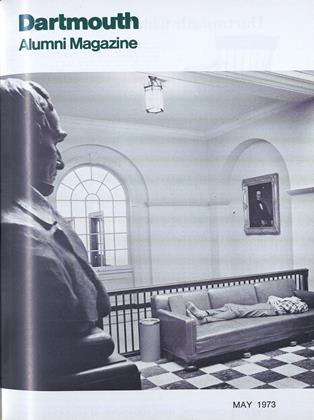PUSHKIN THREEFOLD: NARRATIVE, LYRIC, POLEMIC, AND RIBALD VERSE. THE ORIGINALS WITH LINEAR AND METRIC TRANSLATIONS.
MAY 1973 LUDMILLA B. TURKEVICHPUSHKIN THREEFOLD: NARRATIVE, LYRIC, POLEMIC, AND RIBALD VERSE. THE ORIGINALS WITH LINEAR AND METRIC TRANSLATIONS. LUDMILLA B. TURKEVICH MAY 1973
By WalterArndt (Professor of Russian Language andLiterature). New York: E. P. Dutton & Co.,Inc., 1972. 455 pp. $12.50.
We no longer have to persuade the American reading public of Pushkin's greatness. What we do need is access to more of his works, rendered in English with some of the artistry characteristic of the exquisite Russian originals. Professor Arndt, who is at once a scholar and a sophisticated and sensitive poet, meets this need with unique success in his book Pushkin Threefold.
This attractive volume contains a selection of 74 shorter poems, written between 1817 and 1836, illustrating the great diversity of Pushkin's subject, thought, method, and styles. Most of these poems are translated into English for the first time, and Professor Arndt's excellent metric versions leave the reader with the haunting melodies, beguiling images, or gentle longings of love, patriotism, friendship, admiration of nature induced by the original lyrics. There are also six of Pushkin's longer poems and fragments of his novel in verse, Eugene Onegin. Each is a chefd'oeuvre.
The volume is entitled "threefold" because the works are indeed in three versions: the original one with a linear translation into "plain or sometimes rhythmic prose" on the pages facing the Russian text; and "verse translations reproducing as faithfully as possible the form, the spirit, and the flavor of the originals" are all grouped together at the front of the book. Thus he offers two ways of reading Pushkin in English. Each method is valid in itself but distinct, and each offers different facets of the originals. Furthermore in studying the texts the reader soonfinds himself drawn to witness these two crucial steps in poetic translation and to appreciate some of the incredible succinctness and profundity of Pushkin's works, of the allusiveness and evanescent nuances of the original. But most of all he soon captures some of the magic that stirs th poet.
When on the poet Lord Apollo Does not for mystic homage call, To worldly bustle, pastimes hollow, He lives in petty-minded thrall; Then the celestial lyre is muted, Chill torpor does his heart befall. Amid life's idle and unsuited He seems the idlest wretch of all.
Yet once the god-engendered word But touches on the vivid senses, The poet's soul awakens, tenses Its pinions like an eagle stirred He chafes in worldly dissipation, From human colloguy he flees, Before the idol of the nation He is too proud to bend his knees.
Then will he rush, uncouth and somber, Astir with sounds and wild unease, Toward the shores of desolate seas, To murmuring wildwoods' vast penumbra.
("The Poet" pp. 29-30)
Professor Arndt introduces the volume with an essay on the aesthetics of translation that is as thought-provoking and elegant as anything written by Edmund Wilson, C. M. Bowra, or Richard Blackmur. In it he expounds his philosophy and methodology and communicates the incomparable excitement of his own creative experience as he wrestled with Pushkin. His goal, as he says, was "to create a poem in the target language, which should simulate, as near as may be, the total effect produced on the contemporary reader." He achieved this goal and PushkinThreefold will be a source of great and lasting enjoyment for our lovers of fine literature.
Mrs. Turkevich is Professor of Russian andChairman of the Russian Department at Rutgers,the State University.
 View Full Issue
View Full Issue
More From This Issue
-
 Feature
FeatureWhat's So New About It?
May 1973 By Joanna Sternick, A.M. '72 -
 Feature
FeatureLAND OF LOVE
May 1973 By Ralph J. Fletcher '75 -
 Feature
FeatureSCOPE: Off-Campus Options Made Easier
May 1973 By MARY ROSS -
 Article
ArticleThe Indian Yell Revisited
May 1973 By Russell O. Ayers '29 -
 Article
ArticleFaculty
May 1973 By ROBERT B. GRAHAM '40 -
 Article
ArticleHis Own Man
May 1973 By DERO A. SAUNDERS '35







